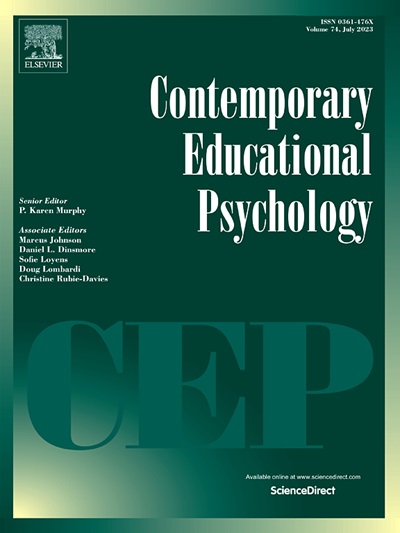Confusion and confusion regulation: An empirical investigation of the emotion regulation in achievement situations model
IF 3.8
1区 心理学
Q1 PSYCHOLOGY, EDUCATIONAL
引用次数: 0
Abstract
We examined the antecedents and consequences of confusion and confusion regulation during complex statistics problem-solving. One hundred sixty-eight university students from Canada, the US, and the UK reported their trait-like habitual confusion regarding statistics, and perceptions of control for solving complex statistics problems. After learning about the binomial theorem, students were asked to solve three complex statistics problems. A think-emote-aloud protocol was used to capture confusion and confusion regulation during problem-solving. Following problem completion, students reported the intensity of the confusion they felt during problem-solving, their perceptions of control during problem-solving, along with the frequency with which they used confusion regulation strategies, including competence development, cognitive reappraisal, expressive suppression, and control-focused strategies. Path analyses revealed that initial confusion about statistics negatively predicted students’ initial perceived control for the task, and that initial perceived control negatively predicted confusion experienced during problem-solving. Initial perceived control also served as a positive antecedent to competence development. Confusion did not predict any confusion regulation strategies but moderated cognitive reappraisal and suppression whereby only higher levels of confusion predicted higher levels of those two strategies. Confusion during problem-solving also negatively predicted perceived control during problem-solving, which subsequently predicted problem-solving achievement. Finally, competence development and the use of control-focused strategies positively predicted perceived control during problem-solving. Results indicate that perceived control serves as an important antecedent to confusion regulation, that confusion moderates these relations, and support the reciprocity of Emotions in Achievement Situations (ERAS) model.
困惑与困惑调节:成就情境模型中情绪调节的实证研究
我们研究了在复杂统计问题解决过程中混淆和混淆调节的前因后果。来自加拿大、美国和英国的168名大学生报告了他们对统计的习惯性困惑,以及在解决复杂统计问题时对控制的看法。在学习了二项式定理之后,学生们被要求解决三个复杂的统计问题。在解决问题的过程中,使用了“思考-表情-大声”协议来捕捉困惑和控制困惑。在问题完成后,学生们报告了他们在解决问题过程中感受到的困惑的强度,他们在解决问题过程中对控制的感知,以及他们使用困惑调节策略的频率,包括能力发展、认知重新评估、表达抑制和以控制为中心的策略。通径分析显示,对统计数据的初始困惑负向预测学生对任务的初始感知控制,而初始感知控制负向预测学生在解决问题时经历的困惑。初始知觉控制对能力发展也有正向影响。困惑不能预测任何困惑调节策略,但会调节认知重评和抑制,只有更高水平的困惑才能预测更高水平的这两种策略。解决问题过程中的困惑也会负向预测解决问题过程中的感知控制,而感知控制随后会预测解决问题的成就。最后,能力发展和以控制为中心策略的使用正向预测解决问题时的感知控制。结果表明,知觉控制是混淆调节的重要前提,混淆调节了这些关系,支持成就情境中情绪互惠模型。
本文章由计算机程序翻译,如有差异,请以英文原文为准。
求助全文
约1分钟内获得全文
求助全文
来源期刊

Contemporary Educational Psychology
PSYCHOLOGY, EDUCATIONAL-
CiteScore
16.50
自引率
3.90%
发文量
74
期刊介绍:
Contemporary Educational Psychology is a scholarly journal that publishes empirical research from various parts of the world. The research aims to substantially advance, extend, or re-envision the ongoing discourse in educational psychology research and practice. To be considered for publication, manuscripts must be well-grounded in a comprehensive theoretical and empirical framework. This framework should raise critical and timely questions that educational psychology currently faces. Additionally, the questions asked should be closely related to the chosen methodological approach, and the authors should provide actionable implications for education research and practice. The journal seeks to publish manuscripts that offer cutting-edge theoretical and methodological perspectives on critical and timely education questions.
The journal is abstracted and indexed in various databases, including Contents Pages in Education, Australian Educational Index, Current Contents, EBSCOhost, Education Index, ERA, PsycINFO, Sociology of Education Abstracts, PubMed/Medline, BIOSIS Previews, and others.
 求助内容:
求助内容: 应助结果提醒方式:
应助结果提醒方式:


